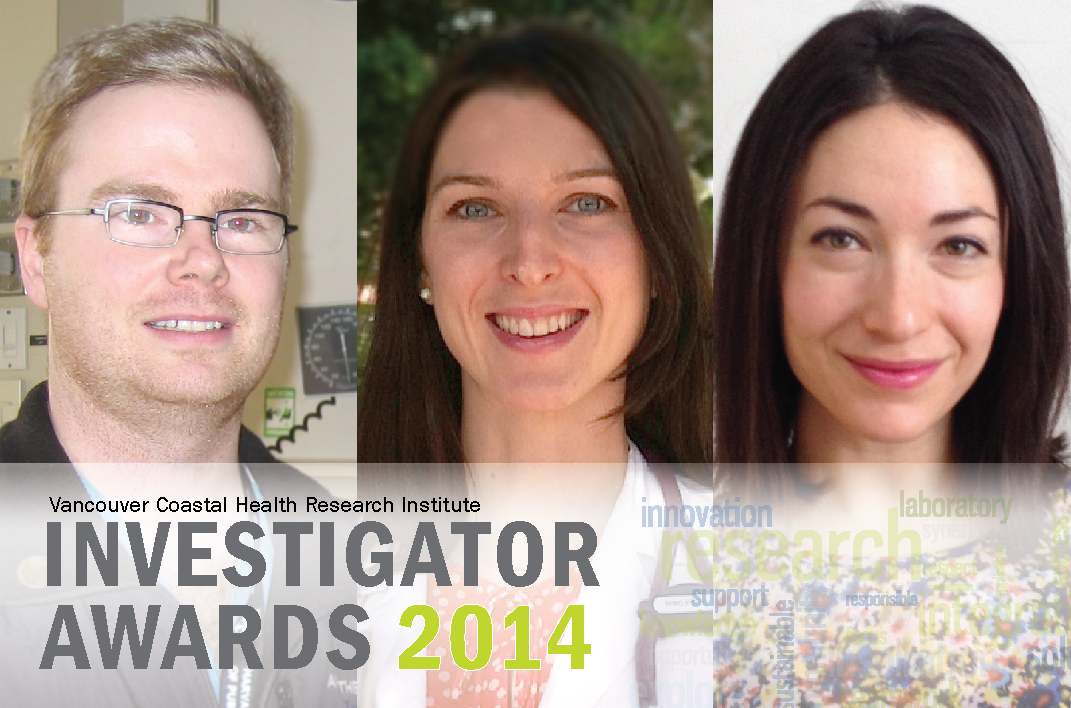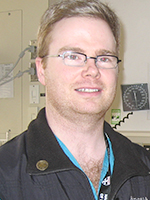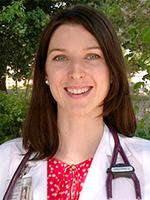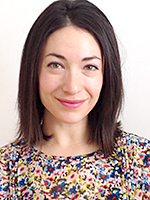
Congratulations to the 2014 VCHRI Investigator Awards recipients — Drs. Donald Griesdale, Margot Davis and Thalia Field.
As one of Canada’s top-funded research institutions, Vancouver Coastal Health Research Institute continues to offer numerous opportunities for growth and advancement to our more than 1,500 personnel in our research centres, programs, and research areas. Our annual Investigator Awards are peer-reviewed salary support awards for investigators located at VGH, UBC Hospital and G.F. Strong Rehabilitation Centre who want to move from clinical practice to research. Provided in partnership with VGH & UBC Hospital Foundation, the Investigator Awards are another example of how VCHRI promotes excellence in work and celebrates research.
Congratulations to the 2014 Investigator Awards recipients —
Can saltwater save the traumatically injured brain?

Traumatic brain injury (TBI) is a major cause of death and disability worldwide. Each year in Canada, nearly 17,000 patients are hospitalized after suffering a TBI. Swelling from fluid accumulation within the brain after injury is common. This swelling can put pressure on the surrounding brain leading to further brain injury. Dr. Griesdale’s research will examine how to reduce brain swelling following TBI by introducing a high concentration of salt water (i.e. hypertonic saline or HTS) into the circulatory system.
“We believe that HTS will decrease the pressure within the brain and improve blood flow by drawing water from the brain tissue itself and into the blood vessels,” says Dr. Griesdale. “Most studies have only looked at HTS given as a single dose; however, with brain swelling lasting for five to seven days, there may be benefit to providing HTS continuously for this period of time.”
“If we demonstrate that HTS reduces brain pressure, we can then go forward with a larger trial to see if HTS improves neurologic function at six months after injury,” he adds.
Why heart disease is an equal concern for breast cancer patients?

Heart disease is the most common cause of non-cancer death in women with breast cancer. In fact, women over 65 who are diagnosed with breast cancer for the first time are more likely to die from heart disease than from cancer.
Dr. Davis’s study aims to compare the risks of heart disease in women diagnosed with breast cancer to the risks in other women in B.C., and to determine what factors increase this risk. Dr. Davis also plans to study whether women diagnosed with breast cancer use more health care services related to heart disease than other women in B.C., and if they have heart problems, whether they receive the same quality of care as other women. This will be the first project to study the way that health care related to heart disease is provided to women who have had breast cancer.
“Our results will provide important new information about which treatments provide the most benefit to women who have had breast cancer,” says Dr. Davis. “My main goal is to reduce the risk of death and disability from heart disease in this rapidly growing population.”
Early research experiences during her residency training developed Dr. Davis’s interest in academic medicine and clinical research. Dr. Davis is currently enrolled in the Masters of Science degree program at the Harvard School of Public Health, majoring in clinical epidemiology, and is a postdoctoral fellow in cardio-oncology and cardiac amyloidosis at Stanford University. She will be joining the VGH faculty as a clinical assistant professor in the UBC division of cardiology in July 2014.
TD GrantS in medical Excellence — Early detection of cerebral small vessel disease may prevent stroke and dementia

Cerebral small vessel disease (CSVD) is a common brain disease that affects the small blood vessels in the brain, causing 20% of strokes and contributing to 45% of dementia. More than 300,000 Canadians are affected by CSVD, and many more have silent, early changes in the brain that are difficult to detect.
Dr. Field’s study will evaluate the effectiveness of therapies (aggressive blood pressure treatment and exercise) early in the disease and also aims to detect patients with CSVD in the earliest stages of their disease. The ability to better identify patients very early in their disease course could facilitate early intervention and reduce the possibility of stroke, dementia and disability.
“My enthusiasm for research into stroke prevention and treatment is longstanding,” says Dr. Field. “My goal is to become a leading expert in cerebral small vessel disease and stroke prevention, and to improve patient and caregiver quality of life by identifying therapeutic targets and treatments for cerebrovascular disease.”
Dr. Field received formal training in statistics and research methodology through the Master’s of Health Science at the School of Population and Public Health at UBC. Dr. Field has also trained through the UBC Clinician-Investigator Program Fellowship.
The Investigator Awards are funded by VGH & UBC Hospital Foundation. This annual funding program provides clinicians with protected time, allowing them to focus on advancing their research careers.
Dr. Field is the recipient of a grant from TD Bank Group, facilitated by VGH & UBC Hospital Foundation. TD is committed to investing in the future by promoting excellence and building health research capacity through peer reviewed salary support for early career clinician scientists located at VGH, UBC Hospital and GF Strong Rehabilitation Centre. As a result, TD has established the TD Grants in Medical Excellence, which will fund research time and reduce clinical commitments for individuals early in their career who are clinically practicing and conducting research.
Learn more about the award recipients and their research.


